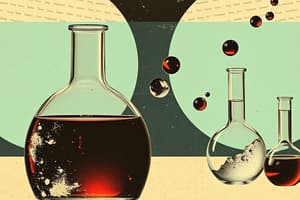Podcast
Questions and Answers
What is the main reason why ions are charged particles?
What is the main reason why ions are charged particles?
- They lack both protons and electrons
- They have an imbalance of protons and electrons (correct)
- They contain only electrons
- They are composed of neutrons and protons
Which type of ion forms when single atoms gain or lose electrons?
Which type of ion forms when single atoms gain or lose electrons?
- Polyatomic ion
- Neutronic ion
- Diatomic ion
- Monatomic ion (correct)
What does the prefix 'poly-' indicate in polyatomic ions?
What does the prefix 'poly-' indicate in polyatomic ions?
- One atom
- Two or more atoms (correct)
- No atoms
- Infinite atoms
Why is it possible for groups of atoms to collectively develop a charge?
Why is it possible for groups of atoms to collectively develop a charge?
What characteristic defines the variability in the number of atoms within a polyatomic ion?
What characteristic defines the variability in the number of atoms within a polyatomic ion?
Flashcards are hidden until you start studying
Study Notes
Atoms and Ions
- Atoms can gain or lose electrons to form charged particles called ions
- Ions are formed due to an imbalance of protons and electrons, which are oppositely charged particles
Types of Ions
- Monatomic ions: formed when a single atom gains or loses electrons
- Polyatomic ions: formed when a group of atoms collectively develops a charge
- The prefix 'mono-' refers to one atom, and the prefix 'poly-' refers to many (two or more) atoms
- The number of atoms in a polyatomic ion is variable
Studying That Suits You
Use AI to generate personalized quizzes and flashcards to suit your learning preferences.




